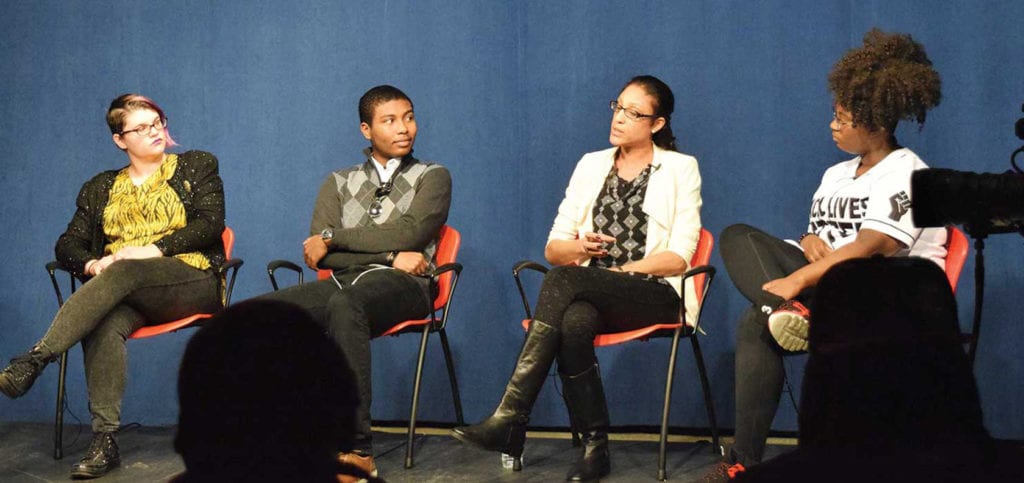Somerville residents discuss race relations
Panel discussion participants give varied perspectives on issues surrounding race

Diane Wong, co-host of the podcast show “Let’s Talk About Race,” led a frank discussion on race relations in the U.S. at a Jan. 19 event broadcast on live television from Somerville Media Center.
Joining the discussion were five panelists who all have been previously featured on the show: Pharaoh Saunders, co-host of “Let’s Talk About Race” and political science student at University of Massachusetts Boston; Tina Cabral, former writer for the Bay State Banner and front desk media coordinator at SMC; Crystal Chandler, Boston filmmaker and producer; Raeshelle Cooke, Boston filmmaker and founder of RMC Pictures; and Heather McCormack, youth media director at SMC.
The radio show has invited guests from all backgrounds to engage in open conversations around issues related to race since it launched in November 2017, and Saturday’s event is part of an ongoing series that will see public discussions on race throughout the Greater Boston Area.
“Our country has a long history of race oppression. Because of this largely unprocessed history, fear of discussing race permeates our national culture,” said Wong. “Somerville is no different. We must engage with race in order to break the cycles of oppression that penetrate our lives.”
During the panel discussion, streamed live on Somerville Community Access Television, the panelists self-identified their race and ethnicity, acknowledging distinctions between the two, and discussed how race affected their childhoods, education and careers.
Self-identification
Some of the panelists grappled with what being black meant for how they were viewed by others and how they viewed themselves, especially in the context of historical belonging.
“I think understanding that your story doesn’t start with slavery is important,” said Saunders. “If your education on black history says black people’s stories started with slavery, then that will affect how you see black people. But there is a rich and complex history of where black civilization comes from.”
Other panelists, like Cabral and Chandler, talked about how they both identify as black women from distinct backgrounds, Cape Verdean-American and Barbadian-American respectively, and also about the rejection of “blackness” within their ethnic communities.
“It was instilled in me growing up that I was different from black Americans,” said Chandler, whose father is from Barbados. “I grew up thinking there was something different between black Caribbean people and African Americans. There are some cultural differences, but truly there are not a lot of differences.”
Cabral, who was born in Cambridge, Massachusetts and has two Cape Verdean parents, said, “There are some Cape Verdeans who don’t consider themselves black, even if they have darker skin — they just say they are Cape Verdean. Some people who were born in Cape Verde under Portuguese rule identify as Portuguese. They embrace the European influence, not the African one.
Adding to Cabral’s comment, Wong said, “The issue isn’t just with white people. We’re struggling too. The main reason why is because we don’t bring this topic up, but colorism is big.”
In her straightforward man-ner, Wong said, “We do see race and color, and we certainly see class because we have economic discrimination. We’re a white supremacist society that believes in capitalism.”
Black Lives Matter
The conversation turned to Black Lives Matter and police brutality. Cooke described her experience being a black liberal creative in Boston, usually in settings with other white liberal creatives.
“At a writing workshop in Boston in 2016, someone created a story about clowns being oppressed and people related it to the LGBTQ community being oppressed,” she said. “I was the only black woman in the room, and I spoke up and said, ‘It relates to cops killing black people’ and the white people were silent and went back to talking about LGBTQ issues.”
She continued, “If you’re a liberal and you’re outraged when gay people are oppressed, when white women are violated and immigrants are oppressed, you also need to be outraged when black people get killed. Our lives matter too.”
McCormack said, “There is a lot of white silence when it comes to police brutality because it doesn’t touch us. … We need to use our privilege to protect those who don’t [have that privilege]. White people need to speak out and risk the uncomfortable conversation, which — God, that’s not a risk. Losing your life is a risk.”
Further discussing the idea of “whiteness,” McCormack said, “Whiteness is not having to talk about race, it’s the default, it’s the standard. I was born and socialized in a society that taught me to be racist … it’s something I will work on for the rest of my life.”
In response to this, Wong said, “All of us who grew up in the U.S. were socialized into the same racist society.”
After the televised panel, SMC hosted a community meal for attendees and continued racial dialogues, facilitated by the panelists, open to anyone in the community.
When asked whether this type of dialogue would have been as open a decade ago, Saunders said, “I think it would have been done with more hesitation, but the point of the show is, these are uncomfortable topics. So it may never be a comfortable time to do it, but it’s always an important time.”
Born into a Black, Chinese, Mexican, Irish, Native American family, Wong grew up in Cleveland and attended Harvard Law School. After living in Portland, Oregon for five years, she made her way back to Boston in 1996.
She launched the “Let’s Talk About Race: Healing our Human Family, One Conversation at a Time” podcast in 2017 with Saunders as co-host.
The podcast can be heard on bostonfreeradio.com on Thursdays 7 to 8 pm.


![Banner [Virtual] Art Gallery](https://baystatebanner.com/wp-content/uploads/2024/04/Cagen-Luse_Men-at-store-e1713991226112-150x150.jpg)



